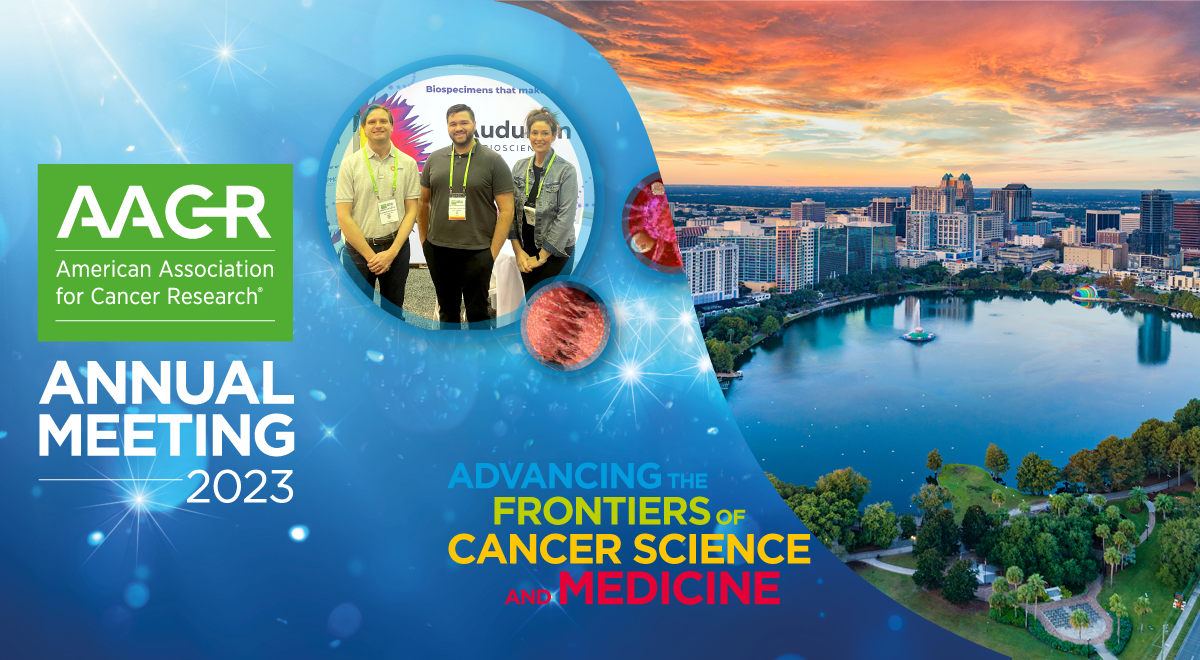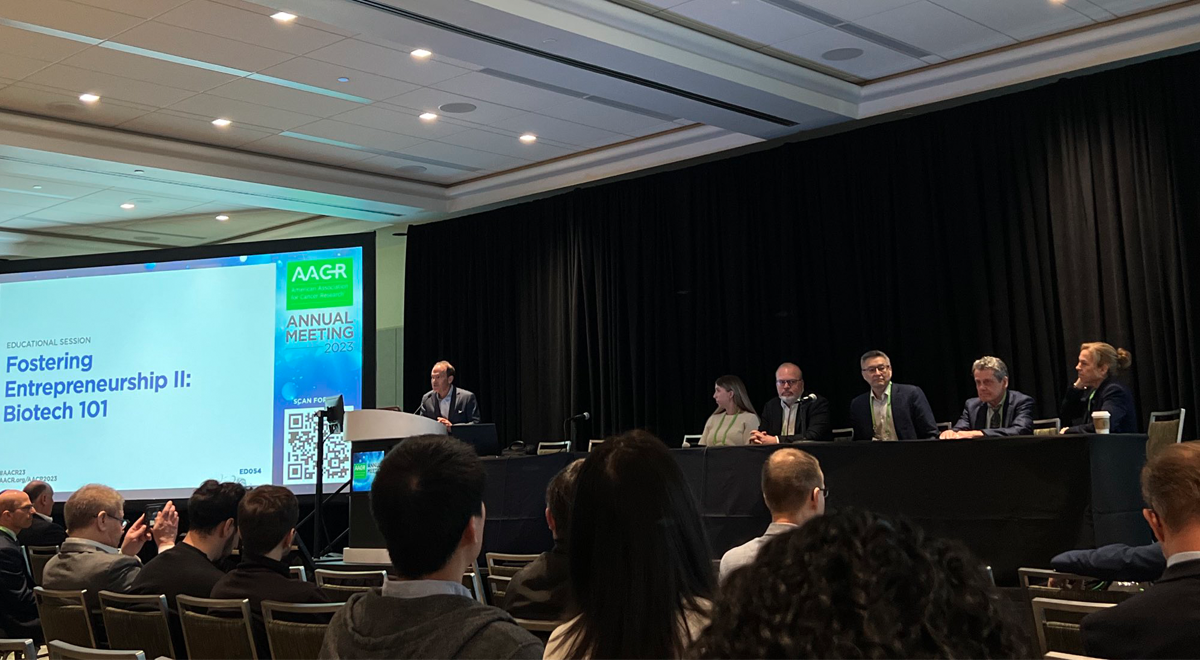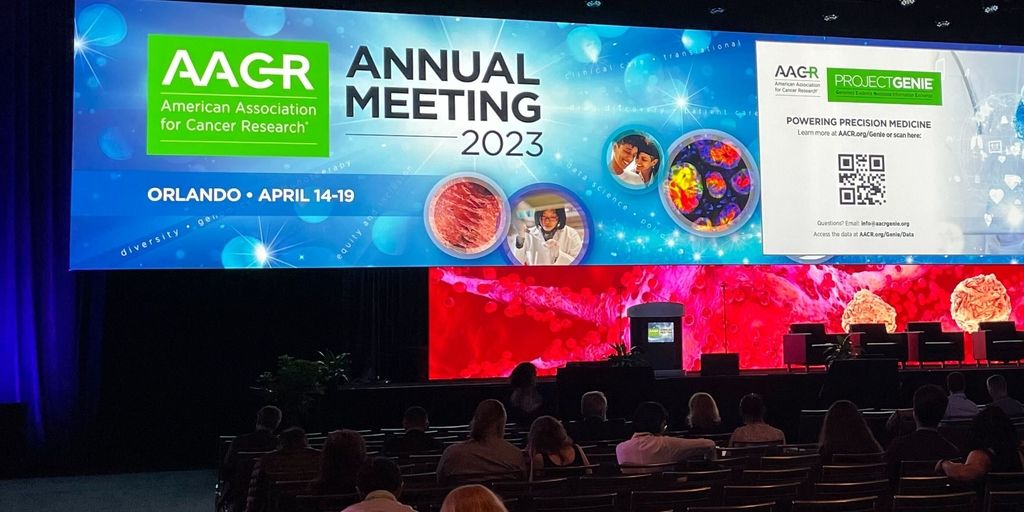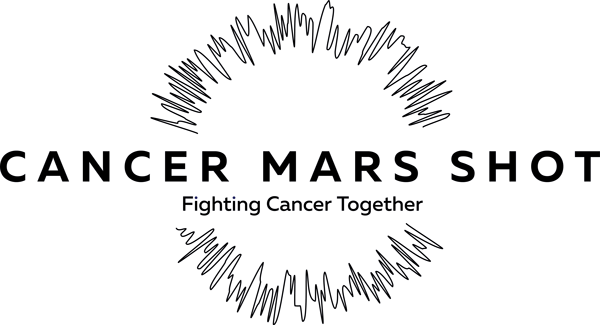AACR 2023 Annual Meeting Summary Report and Highlights

The American Association for Cancer Research (AACR) held its 2023 Annual Meeting themed, Advancing The Frontiers of Cancer Science and Medicine, from April 14 - 19 in Orlando, Florida, and it was a resounding success. Our Audubon Bioscience conference team was honored to exhibit for the second time in a row at this meeting and had the opportunity to meet several partners, clients, and experts in the industry. This meeting brought together cancer researchers, clinicians, patient advocates, and industry professionals from around the world to share the latest breakthroughs and discoveries in cancer research and treatment.
The conference featured a range of sessions and presentations covering various aspects of cancer research, including new drug discovery and engineering, biomedical research challenges, clinical trials, and survivorship. For our Audubon Bioscience conference team, It was an exciting experience to meet with our partners face-to-face, make new connections, and share our latest turn-key solutions in supporting the development of life-saving cancer treatments through efficient biospecimen procurement, as well as patient data management.
Reflecting on this year’s Annual meeting theme, “Advancing the Frontiers of Cancer Science and Medicine” –– “The progress that has been made, and the progress still to come, is a testament to the global cancer community working together to reduce the toll of the disease, said AACR CEO Margaret Foti, Ph.D., MD (hc), in her remarks to attendees at the opening ceremony of the 2023 AACR Annual Meeting on Sunday, April 16.
Here are the main highlights from the AACR 2023 Annual Meeting according to our conference team, and the roles of biobanking, personalized medicine research, and biomarker discovery and validation in advancing cancer research.
Immunotherapy and Precision Medicine

Another area of focus at the conference was precision medicine, which involves tailoring cancer treatments to the specific genetic and molecular characteristics of each patient's tumor. Researchers presented promising results from several precision medicine trials, including targeted therapies and immunotherapies.
For example, a team of researchers from Memorial Sloan Kettering Cancer Center presented significant research on cancer disparities, analytical tools for precision medicine, genomic biomarkers, tumor biology, immunology, and more. They also presented results from Phase II Clinical Trials 2 of an experimental therapy called larotrectinib. The drug targets a specific genetic mutation found in a variety of tumors, including rare types of cancer that have historically been difficult to treat. The trial showed promising results, with 76% of patients experiencing a partial or complete response to the treatment.
Liquid Biopsies and Early Detection
Another area of focus at the conference was the use of liquid biopsies for early detection of cancer. Liquid biopsies are non-invasive tests that can detect circulating tumor cells and DNA in the blood, allowing for earlier detection of cancer and more effective treatment. Researchers presented data on the use of liquid biopsies for early detection of lung, breast, and colon cancers, as well as their potential for monitoring treatment response and detecting cancer recurrence. One notable study presented at the conference showed that a liquid biopsy test was able to detect the presence of early-stage pancreatic cancer with a high degree of accuracy.
According to one of the presenters, Ben Ho Park, MD, Ph.D., Professor of Oncology at Vanderbilt University Medical Center, “Detection of cancer in early stages through screening programs has been demonstrated to save lives. However, only a few cancer types have screenings available today, and the majority of cancer deaths are from cancers for which there are no screening methods.”
Following the data from a retrospective study presented at the meeting, Multicancer early detection (MCED) test that is based on liquid biopsy could detect up to twelve (12) cancer types, including low DNA-shedding cancers and early-stage cancers. Audubon Bioscience is committed to helping scientists, medics, and healthcare professionals in the course of early detection of these cancer types by providing cutting-edge human biospecimens on a large scale level.
Patient-centered Research and Survivorship
The AACR 2023 Annual Meeting also highlighted the importance of patient-centered research and survivorship. Several presentations focused on the psychosocial and quality-of-life issues faced by cancer survivors, as well as strategies for improving survivorship care and support.
One particularly moving session featured a panel of cancer survivors who shared their stories and perspectives on the importance of patient-centered research and the need for greater involvement of patients in the cancer research process. The panelists emphasized the importance of communication and empathy from healthcare providers, as well as the need for more resources and support for survivors and their families.
Other notable presentations focused on the role of exercise and physical activity in cancer survivorship. Researchers presented data showing that exercise can improve quality of life and reduce the risk of recurrence in cancer survivors and discussed strategies for promoting exercise and physical activity in this population.

The Role of Biobanking and Biospecimens in advancing cancer research
The evolvement of biosamples procurement has sprung the need and opportunity for large-scale networking at national and international levels. While there is still much work to be done in the fight against cancer, the progress made at this year's meeting is cause for hope and optimism. As researchers continue to collaborate and innovate, Audubon Bioscience continues to commit itself to supporting the development of these patient-derived biospecimens, ensuring their prospective procurement and logistics to clinics and research institutes.
The work we do at Audubon Bioscience has contributed to moving the industry from the era of collecting illicit biosamples from unsuspecting patients to the fully facilitated biobanks that we have today, giving clinicians and researchers the opportunity to better understand and fight this disease.
The AACR Annual Meeting 2023 was a dynamic and informative gathering of cancer researchers and professionals, showcasing the latest advances in cancer research and treatment. At Audubon Bioscience, we are proud to be a part of this community and to contribute to the progress being made in the fight against cancer. We look forward to continuing to work with our clients and partners to advance cancer research and improve outcomes for patients worldwide.

